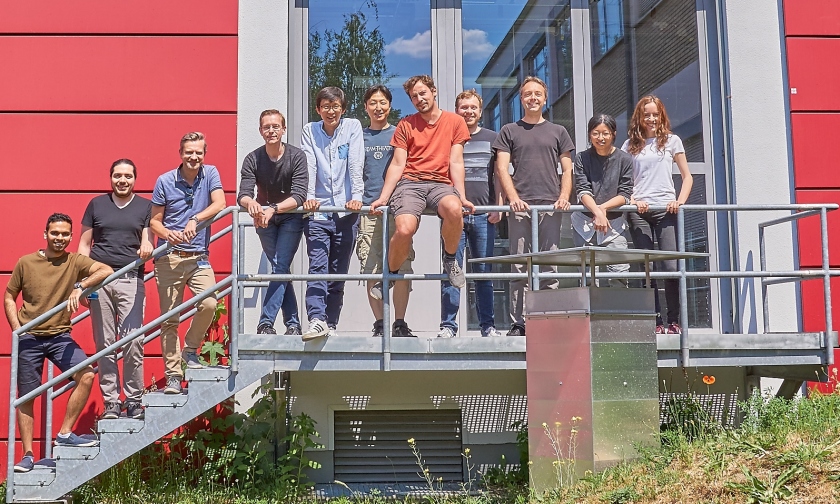Collaboration between HZB and the University of Freiburg

The theory group with Joe Dzubiella. © HZB
Through a Joint Research Group entitled “Simulation of Energy Materials“ Prof. Joachim Dzubiella of the Albert-Ludwigs-Universität, Freiburg will be able to continue his collaboration with the HZB. The theoretical physicist headed the “Theory and Simulation“ group at the HZB until recently and worked closely together with colleagues conducting experimental research. The new research group will concentrate on electrochemical energy storage and solar fuels.
From 2010 until spring 2018, Joachim Dzubiella was a scientist at HZB carrying on research and building up his theory group. He appreciated the short paths to experimentalists and worked closely with them. In 2015 he received a Consolidator Grant from the European Research Council that enabled him to further expand his group.
The physicist accepted a W3 professorship in Applied Theoretical Physics at the University of Freiburg In April 2018. But the collaboration with the HZB will continue. This has been made possible now through a Joint Research Group entitled "Simulation of Energy Materials" funded by the Helmholtz-Zentrum Berlin and the University of Freiburg.
“In the field of solar fuels, there is great interest in more clearly understanding the processes taking place at the catalyst layers that facilitate the splitting of water“, explains Dzubiella. There are also numerous aspects of electrochemical energy storage that can be analysed significantly better through modelling. The Joint Research Group currently consists of seven researchers. The focus is on what happens at the interfaces between liquid and solid phases, which are simulated by theorists with computer models in order to track down the driving forces.
The group members from Freiburg and Berlin will exchange ideas with Skype meetings, visits, and retreats in the countryside. Initial funding has been secured for five years.
More Information: http://helmholtz-berlin.de/forschung/oe/ee/simulation/
arö
https://www.helmholtz-berlin.de/pubbin/news_seite?nid=14948;sprache=en
- Copy link
-
What Zinc concentration in teeth reveals
Teeth are composites of mineral and protein, with a bulk of bony dentin that is highly porous. This structure is allows teeth to be both strong and sensitive. Besides calcium and phosphate, teeth contain trace elements such as zinc. Using complementary microscopy imaging techniques, a team from Charité Berlin, TU Berlin and HZB has quantified the distribution of natural zinc along and across teeth in 3 dimensions. The team found that, as porosity in dentine increases towards the pulp, zinc concentration increases 5~10 fold. These results help to understand the influence of widely-used zinc-containing biomaterials (e.g. filling) and could inspire improvements in dental medicine.
-
Fascinating archaeological find becomes a source of knowledge
The Bavarian State Office for the Preservation of Historical Monuments (BLfD) has sent a rare artefact from the Middle Bronze Age to Berlin for examination using cutting-edge, non-destructive methods. It is a 3,400-year-old bronze sword, unearthed during archaeological excavations in Nördlingen, Swabia, in 2023. Experts have been able to determine how the hilt and blade are connected, as well as how the rare and well-preserved decorations on the pommel were made. This has provided valuable insight into the craft techniques employed in southern Germany during the Bronze Age. The BLfD used 3D computed tomography and X-ray diffraction to analyse internal stresses at the Helmholtz-Zentrum Berlin (HZB), as well as X-ray fluorescence spectroscopy at a BESSY II beamline supervised by the Bundesanstalt für Materialforschung und -prüfung (BAM).
-
Element cobalt exhibits surprising properties
The element cobalt is considered a typical ferromagnet with no further secrets. However, an international team led by HZB researcher Dr. Jaime Sánchez-Barriga has now uncovered complex topological features in its electronic structure. Spin-resolved measurements of the band structure (spin-ARPES) at BESSY II revealed entangled energy bands that cross each other along extended paths in specific crystallographic directions, even at room temperature. As a result, cobalt can be considered as a highly tunable and unexpectedly rich topological platform, opening new perspectives for exploiting magnetic topological states in future information technologies.
